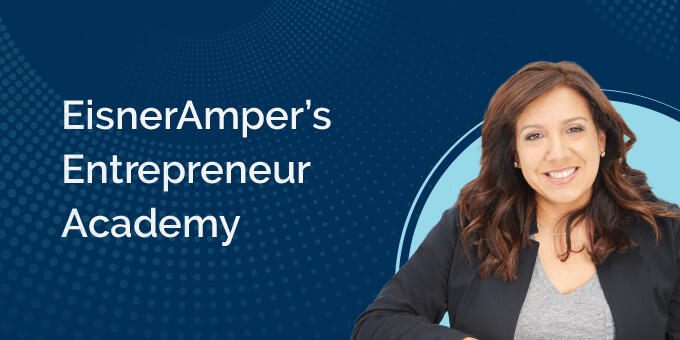Entrepreneur Academy
- Published
- Mar 9, 2022
- Topics
- Share
Is your company preparing for (or have you recently had) an IPO? In this video, you’ll learn about the impact that an ownership change under IRC Sec. 382 can have on the utilization of net operating loss (NOL) carryovers and other factors that can influence your tax burden.
In This Issue:
Transcript
Michael Grant:Hello, my name is Michael Grant and I'm a director at Eisner Advisory Group. I've been with the firm for over 15 years, and one of my specialties is IRC 382 studies.
One of the more common questions I get asked from our tech and life science clients is a company's planning or just had an initial public offering, what impact does that have on our net operating loss carryovers?
My first response to them is always to ask them if they've ever had or performed a 382 study. Under Internal Revenue Code Section 382, the ability of a loss corporation to utilize their historical NOL carryovers and other tax attributes, such as R&D credits, could be limited it if the corporation undergoes a accumulative ownership change of greater than 50%.
A common misunderstanding is that the 50% change has to occur in one transaction or be held by one shareholder. In actuality, the 50% threshold is cumulative and is calculated over a three year rolling period by analyzing the various 5% shareholders of the company.
Because of the cumulative nature of the calculation one of the common causes of an ownership change is an IPO. In a situation where an IPO does trigger a change under IRC 382 all of the loss corporations historical NOL carryovers and credits could be limited on how they can be used going forward. I always like to paint the picture of these carryovers being thrown in jail, and each subsequent year an amount comes out of jail and becomes available for use. This annual amount is referred to as the annual limitation and is calculated at the time of the ownership change.
The annual limit is calculated as the value of the loss company immediately before the ownership change, and that is multiplied by the highest long term tax exempt rate for the three month period ending with the month of change. The current rate is around 1.4%, so for illustrative purposes if we have a life science company value at a hundred million dollars the resulting annual limitation would be $1.4 million. This means that each year after the ownership change $1.4 million of the trapped NOLs would become available for use.
Since the driving factor behind the limitation is the value of the company there could be situations where NOLs would be lost forever without the ability to be utilized. Having a 382 study in place leading up to or immediately after an IPO can save significant time and cost. The longer client's wait to have a study performed the more challenges that could arise. Historical record keeping can be lax and more difficult to piece together. The backbone of these calculations are the historical records so if those are not accurate or have been lost over time then the accuracy of the calculations will be compromised.
Knowing the impact of an ownership change under IRC 382 is important for a number of reasons, including the utilization of the NOLs, deferred tax asset reporting, and planning for the preservation of the NOL carryovers.
Once an initial study has been performed the template can be used as a planning tool for future capital raises to manage and preserve the NOLs. There would be no worse situation than having taxable income and thinking that you have enough NOLs to cover the tax burden, only to find out that an ownership change was triggered and the NOLs are actually not available.
Hopefully I was able to give you a basic understanding of how IRC 382 could impact your IPO and tax planning moving forward. Please feel free to contact me if you have any questions.
Entrepreneur Resource Hub
EisnerAmper’s Entrepreneur Academy “EA2” offers early-stage startups continuous learning opportunities—from fundraising to mitigating risk to growing their businesses.
What's on Your Mind?
Start a conversation with Michael
Receive the latest business insights, analysis, and perspectives from EisnerAmper professionals.



